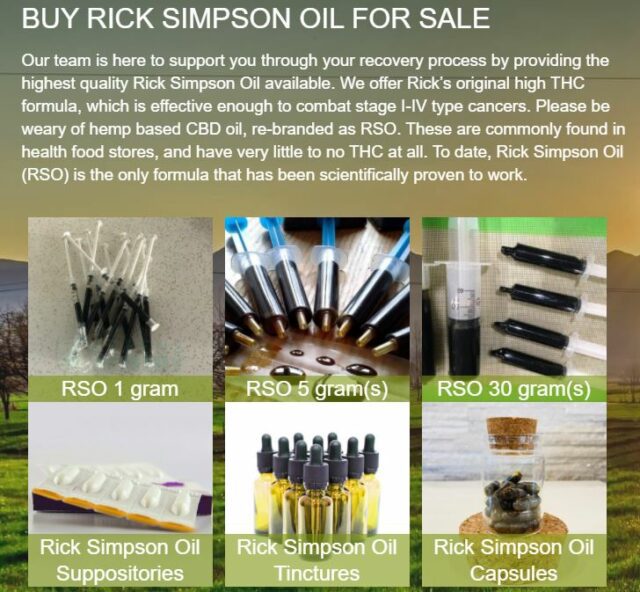A couple of cannabis products have emerged on Canada’s regulated market under the name of an unregulated high-potency THC oil anecdotally said to treat cancer, which some industry veterans say is a marketing technique taking advantage of misinformation.
“[Consumers] do not understand that it’s not just about taking a bunch of THC. There’s a lot of things involved and there’s no evidence at work,” Evergreen Cannabis co-owner Mike Babins tells Mugglehead by phone.
Named after its inventor, Rick Simpson Oil (RSO) is an edible or topical full-spectrum extract using pure light aliphatic naphtha or isopropyl alcohol, and contains over 90-per-cent THC, according to Simpson’s website.
Read more: CBD gains increasing attention as potential cancer treatment
Read more: Cannabics Pharmaceuticals files patent for cannabinoid colon cancer treatment
When Simpson, who already used cannabis to ease his own medical issues, found out he had skin cancer in 2003, he made a highly concentrated full-spectrum cannabis oil which he says resulted in his cancerous skin bumps disappearing. He was originally inspired by early research suggesting cannabis could treat cancer in mice.
https://twitter.com/ecsvan/status/1428077997811113986
RSO, also called Phoenix Tears, is now associated with numerous — though not clinically verified — medical success stories of people following in Simpson’s footsteps over the years. Companies using that name are just trying to make money, Babins says.
“They could have easily called it something different. It’s inappropriate.”
Licensed producer Mera Cannabis Corp. is selling an oil product called RSO under its brand Ellevia. It’s listed on the Ontario Cannabis Store as being extracted using alcohol, and has a potency of 68.8-per-cent THC. Stigma Grow sells its own RSO Caps with 8.5–10 milligrams of THC.

The Ontario Cannabis Store lists two products with RSO in their name. Screenshot by Natalia Buendia Calvillo
Babins thinks these companies won’t face legal repercussions because the RSO name isn’t patented, and they don’t make any direct claims it cures cancer or helps in any way.
Mugglehead reached out to Mera Cannabis and to Stigma Grow about their RSO products, but neither responded to requests for comment.
While there’s no clinical evidence to back that highly concentrated cannabis can cure cancer, for over ten years Simpson spread the word of his supposed miracle treatment, which is still found online for free. On his website, he encourages people to make it themselves rather than buying it, but it’s still sold by various unregulated and regulated sellers.
Florida medical cannabis giant Trulieve Cannabis Corp. (CSE: TRUL) (OTC: TCNNF) sells its own RSO formulation.

High-THC cannabis oils labelled RSO or Phoenix Tears continue to be sold on the black market alongside claims of medical benefits. Screenshot by Natalia Buendia Calvillo
“This harmless non addictive natural medication can be used with great success, to cure or control cancer, multiple sclerosis, pain, diabetes, arthritis, asthma, infections, inflammations, blood pressure, depression, sleeping problems and just about any other medical issues that one can imagine,” reads Simpson’s Phoenix Tears website.
The American Cancer Society lists marijuana as a remedy to ease symptoms such as the nausea and dizziness caused by chemotherapy. While there appears to be some grounds for cannabis having anti-cancer properties, no such claims have been clinically verified.
Read more: Convincing my ex-marine dad to fight his Parkinson’s with marijuana
RSO not about consistency or colour, but THC concentration
Babins explains RSO isn’t about the thick oil, but instead the high concentration of THC, “So anyone who wants that doesn’t need that gross tasting, black goop when there’s so many clean, high-THC oils available on the market now.”
Simpson’s teachings detailed in his documentary Run From the Cure were primarily on the concentration of THC, and getting to a point of taking 300 milligrams a day.

Evergreen Cannabis carries thick oils based on the same extraction method as RSO which co-owner Babins says aren’t popular among customers. Photo by Nick Laba
Evergreen has carried similar high-THC oils using the same extraction method that are thick or “goopy,” but the poor taste doesn’t mean greater benefits. Babins says the less-tasty oils with similar THC-concentrations “have been collecting dust.”
Correction (2021-8-25 8:45 a.m. PDT): A previous version of this article incorrectly stated that Ellevia’s RSO product was a vape. It’s actually an oil dispensing device.
Follow Natalia Buendia Calvillo on Twitter
natalia@mugglehead.com















Süleyman uysal
March 27, 2022 at 10:00 am
Hi there
I am writing you from turkey. I want to get information about RSO. Can you send it to Turkey if it is used in cancer treatment?
Cindy
April 16, 2022 at 12:20 pm
So where can one get RSO that is high quality in Canada?
Garnie Ross
December 2, 2022 at 10:19 am
RSO is not just about the THC content. Cannabinoid content iis also very important. Numerous strains need to be used in order to have top quality RSO. Every strain has different Cannabinoids. Different strains are used to combat different strains of cancer. Clear oil is not medicinal THC as it’s mostly THC with no other Cannabinoids available. Medical RSO should be black.